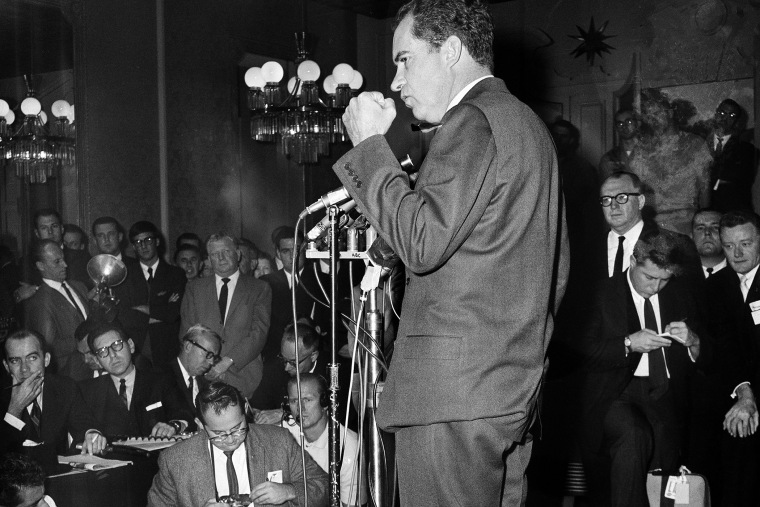On Tuesday night, Mississippi tea partier Chris McDaniel refused to concede that he’d lost his Republican primary runoff against six-term Sen. Thad Cochran, despite a more than 6,000 vote difference with 99% of precincts reporting.
The latest controversy over the Mississippi primary isn't surprising: The race has been particularly messy, involving the police not once, but twice. Still, McDaniel’s hints at legal action and general foot-stomping remarks did win him a spot on our running list of the sorest losers in politics.
Check out our list and tell us in the comments: Whom would you add?
1. State Sen. Chris McDaniel, primary challenger to Sen. Thad Cochran
In a non-concession speech to supporters on Tuesday night, McDaniel suggested that legal action to investigate the results of the runoff might be in the cards. He cited reports of “dozens of irregularities” at polling precincts and of opponents that spent “millions of dollars to character assassinate one of their own.” He went on to slam Cochran for reaching out to “liberal Democrats” in the final days, an unconventional strategy that capitalized on a Mississippi law that allows anyone who plans to vote for a candidate in the general election to vote in the primary regardless of party affiliation.
“Now it’s our job to make sure that the sanctity of the vote is upheld,” McDaniel said. “Before the race ends we have to be absolutely certain that the Republican primary was won by Republican votes.”
Cochran's strategy to win the votes of Democrats caused quite a kerfuffle: Conservative poll watchers rushed to the state, alleging fraud on Cochran's part, and attracted the attention of even the Department of Justice as anxieties of racial profiling and voter intimidation were stoked.
2. Alan Keyes, the Republican who lost to Obama in Illinois U.S. Senate race
In 2004, when then state Senator Barack Obama defeated Republican Alan Keyes in a landslide (the future president won 70% of the votes) the conservative candidate waited two days to concede the race and refused to congratulate his opponent.
"I'm supposed to make a call that represents the congratulations toward that which I believe ultimately stands for and will stand for a culture evil enough to destroy the very soul and heart of my country?" Keyes said at the time. "I can't do this. And I will not make a false gesture."
Keyes later upped his game, by filing a lawsuit claiming the president wasn’t actually an American citizen. It was thrown out of court.
3. Mark Fisher, a Republican who really wanted to be on the ballot in Massachusetts
McDaniel is hardly the first to float the idea of legal action after losing a primary—in fact, a Massachusetts Republican Mark Fisher sued the state’s GOP after losing the right to get his name on the primary ballot by just six votes. Party officials said he’s demanded $1 million to drop the suit, a sum which he later lowered to $650,000. Fisher refutes the claim, saying the party had offered that much. A judge eventually put Fisher on the ballot, with the party’s begrudging okay, but delayed the trial over the damages Fisher is seeking till after the election despite Fisher’s protests that that money was to fund his campaign.
4. Richard Nixon, a man who would go on to be president
Richard Nixon congratulated Gov. Edmund Brown when he lost the California gubernatorial race, but famously turned the screws on the press instead.
The day after his defeat, he lambasted the press in his infamous “last” news conference, saying “you won’t have Nixon to kick around any more because gentlemen, this is my last press conference.” Nixon spent the press conference instructing reporters on how to write the news (his opinion should go at the top of the story) and telling them that someone else would have to lead the Republican Party.
The New York Times reported that “the virtually unanimous opinion of political observers was that the defeat had obliterated the lingering possibility, despite his disclaimers, that he might figure in the presidential race of 1964,” in their front page story. Eight years later, Nixon was elected president.
5. Ken Cuccinelli , the tea partier who wanted to govern Virginia
When Cuccinelli lost in Virginia’s hotly contested gubernatorial race last year, he refused to call and congratulate Democrat Terry McAuliffe on his victory, and delivered a combative concession speech.
"Despite being outspent by an unprecedented $15 million, this race came down to the wire because of Obamacare," he said. "That message will go out to the entire country tonight."
He slammed the media's coverage of his campaign and said McAuliffe's team had “lied their way to this victory.” He went on to blame Republican donors prematurely stopped giving money to the campaign, according to The Washington Post.
6. Barbara Buono, the New Jersey Democrat no one thought could win (and didn't)
Not to be outdone by the Republicans that largely populate this list, Buono accused her own party bosses of opposing her candidacy for money.
“The Democratic political bosses some elected some not made a deal with this governor despite him representing almost everything they’re against. They didn't do it for the state. They did it to help themselves politically and financially,” she said in her concession speech. (Democratic players largely declined to get involved with her race because few thought it was a winnable race: Gov. Chris Christie entered the election with strong approval ratings and eventually won by more than 20-point margin.)
Buono said New Jersey was “the last vestiges of old-boy machine politics,” and slammed the “the onslaught of betrayal from our own political party.”
